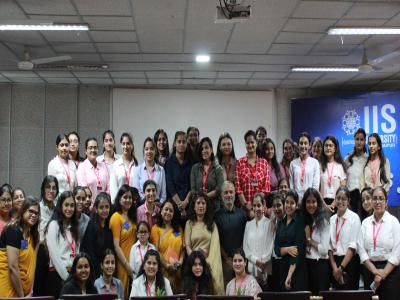Two days National Media Workshop of Digital World of Information and Misinformation

The Department of Journalism and Mass Communication, IIS (deemed to be University) organized the Two Day National Media workshop on Digital World of Information and Misinformation. The two day long workshop had four technical sessions on various topics. The resource persons for the same was eminent media professionals, that is, Rajesh Kalraji, Executive Chairman, Asianet News Media and Entertainment; Mohd Waqas, Deputy Editor, India Today; Hitesh Shankar, Editor, Panchjanya and Rahul MAhajan, Head, Content (Operations) Prasar Bharati.
The workshop commenced with inaugural ceremony held on day one. The guest of honour of the ceremony was Shri Rajesh Kalra. After lightning of the lamp, the guests were felicitated by presenting a painting and flower vase. In his address, Mr. Kalra guided all the participants about the vital role of Rechecking and finding the context before blindly believing and forwarding the information and news received on social media. He also discussed the importance of critical thinking. Mr. Kalra also talked about how algorithms work to make any news popular on digital platforms.
Second session on day one was chaired by Mohammad Waqas. Mr. Waqas shared the insights of how vocabulary and its meaning play a pivotal role in the media misinformation and what impact does social media trends have on dissemination of the news. It was an interactive session where students got to learn about media and misinformation from altogether a different perspective.
Shri Hitesh Shankar in his session broadly described the Media Convergance in today’s era and how the audience is engaged in the same. He differentiated between Misinformation, Disinformation and Mal-information and explained the reasons for the dissemination of the same. He also talked about how the meaning and relevance of words are very important in newsroom.
Shri Rahul Mahajan talked about his experience of reporting in Kashmir region and the difficulties he faced during his work in the region. He also shared how work can be done around such difficulties. The Workshop concluded with the distribution of participation and paper presentation certificates.

